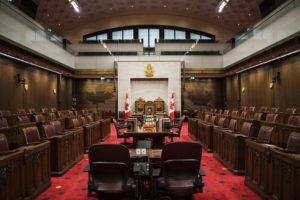Bill S-222 From the Perspective of Charity Lawyers
Senator Omidvar Speaks in the Senate to Bill S-222
In this Carters bulletin, charity lawyers Terrance S. Carter and Theresa L.M. Man comment on Senator Omidvar’s speech on Bill S-222, the Effective and Accountable Charities Act. Read an excerpt of the bulletin below:

The Honourable Ratna Omidvar, Senator for Ontario, and former co-chair of the Special Senate
Committee on the Charitable Sector, moved second reading of Bill S-222, the Effective and
Accountable Charities Act (the “Bill”), in the Senate on March 16, 2021. In her speech, the Senator described the challenges with regard to the “own activities” requirement under the Income Tax Act (Canada)(“ITA”), which restricts the manner in which registered charities can work with organizations that are not “qualified donees.” In this regard, the Senator stated that “this process is outmoded, impractical, inefficient, inordinately expensive and unpopular, […] fails to meet the objectives of the legislation [and] is built upon the fiction that everything that a charity does through a third party intermediary must be structured as the activity of the charity itself when all parties involved know that this activity is that of a third party.”
Click here to read the full bulletin.
Bill S-222: Eliminating the ‘own activities’ requirement for charities
In this article, published in the Lawyer’s Daily, Terrance S. Carter and Theresa L.M. Man describe the purpose of the Effective and Accountable Charities Act. Read an excerpt of the article below:
A new bill introduced into the Senate last month may give Canadian charities much needed legislative reform. Ratna Omidvar, senator for Ontario, tabled Bill S-222, the Effective and Accountable Charities Act (the bill) for first reading on Feb. 8, 2021. The bill proposes significant changes to provisions of the Income Tax Act (ITA) governing how charities in Canada can work with other organizations that are not registered charities — or not otherwise “qualified donees” (which are organizations that can issue official donation receipts). This article offers a brief background of the need for legislative reform and what the new bill proposes to change.
The ITA currently contains unnecessary and archaic provisions that have been in place since the 1950s, requiring charities to devote all of their resources to charitable activities carried on by the organization itself. This is known in the charitable sector as the “own activities test.” This has led the Canada Revenue Agency (CRA) to implement an administrative policy that charities must direct and control the use of their resources when working through an intermediary, known as the “direction and control” requirement. Such a requirement severely limits how charities can work with third parties that are not qualified donees.
Click here to read the full article.